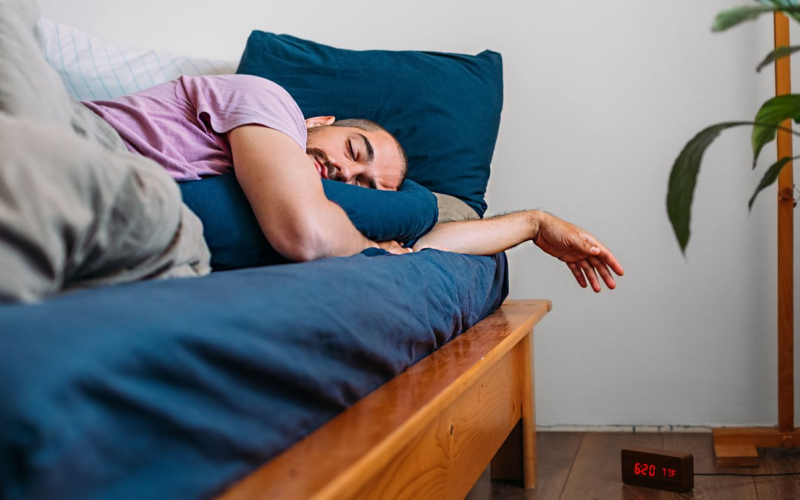If so, you may be overworked. Or, you could have a disorder called sleep apnea, a chronic condition that affects hundreds of millions of people around the world.
As prevalent as it is, sleep apnea is widely overlooked by those who have it, mostly because they’re sleeping when the symptoms occur. However, it’s a serious and dangerous condition that, when left untreated, can become fatal.
Unless you have a bed partner irritated and concerned by your snoring and obstructed breathing, you likely don’t even realize you have the warning signs of sleep apnea.
Although the signs can vary, there are some that are consistently seen by most patients with sleep apnea. If you notice one or all of the following symptoms, talk to your doctor to see if you, too, have sleep apnea.
1. Snoring and Apneas
Snoring happens frequently when you’re sick or overtired. It’s also commonly linked to alcohol consumption, obesity, and back sleeping.
Occasional snores aren’t anything to worry about, and they may even be funny to those around you. But when they become chronic and loud, there’s likely a serious problem, like obstructive sleep apnea (OSA).
OSA is the most common type of breathing disorder in sleeping. It’s characterized by loud snoring, yet the dangerous part of OSA is that you stop breathing.
This stop-start breath-taking is called an apnea. It happens when your throat muscles relax while you sleep. They block your airway, and your brain subconsciously forces you awake enough to take a breath. You may notice this when you jerk awake and feel like you’re choking or gasping to catch your breath.
Apneas are the reason why OSA is such a serious disease. If you’re in a deep sleep due to medications or you have health conditions that make the apnea worse, it can be fatal.
2. Daytime Fatigue
When you have sleep apnea, you’re technically sleeping all night, but it isn’t restful. You might not realize it, but you’re leaving those deep levels of REM sleep every time you have an apnea episode.
OSA patients also produce more urine at night because the lack of oxygen increases blood flow to the kidneys. Switching from sleep cycles makes you alert enough to realize you need to use the bathroom, interrupting your quality slumber once again.
All of these sleep disturbances affect your energy levels the next day. You feel like you’re walking through a fog and constantly sleepy. The official term for this is daytime fatigue.
You’re not tired “for no reason.” Your sleep disorder is preventing you from getting the rest you need to stay alert throughout the day.
3. Cognitive and Mood Concerns
Not getting enough rest affects your body in other ways, too. Because you’re not sleeping, your memory and concentration abilities are reduced.
Studies show that missing sleep reduces your ability to learn and retain new information. It impacts your hippocampus, the part of the brain that creates memories. Each moment of your day is a “memory” waiting to become cemented in your brain, but if you’re not sleeping, the hippocampus isn’t recording those moments as well as it should.
It’s harder to do the job at hand when you have sleep apnea. Interrupted sleep affects your ability to pay attention and concentrate. You may notice that it takes you longer to react, and it’s difficult to stay focused. It takes extra time to notice signals of change in the environment around you, which could be problematic in dangerous situations.
Altogether, memory struggles, interrupted sleep, and delayed thinking understandably make you moody and irritable. You really do need more sleep, but until breathing problems do not disrupt it, it won’t be that high-quality rest that will fix your mental woes.
4. Morning Discomfort
Are you waking up with regular “morning headaches,” dry mouth, and upper body aches and pains? Those, too, are symptoms of sleep apnea, but they have another cause.
OSA is linked to another condition called bruxism. Bruxers grind and clench their teeth in their sleep, causing damage to the enamel, gums, and attached muscles and joints.
One of the main triggers of bruxism is stress. When you have OSA, your body is under severe stress. The brain sends signals to your jaw to clench and grind, which releases stress hormones like cortisol.
Most bruxers wear night guards to reduce the damage to their bodies from the grinding and clenching. However, if you have OSA, your doctor might prescribe other oral appliances along with or in place of a regular night guard. When you stop the behaviors caused by bruxing, those annoying and painful side effects will slowly disappear.
Conclusion
Do you recognize most or all of these symptoms of sleep apnea? If so, don’t wait. Make an appointment to talk to your doctor as soon as possible.
Remember, billions of people have the same condition, and it’s easily controlled with treatment. But without help, sleep apnea can cause serious damage to your body. Seek medical care early, and you’ll get back to living life with good-quality sleep!

